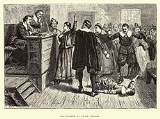How might have witch-hunts been used as tools tto remove an enemy or for economic or political gain?
replied to: rich2323
Replied to: How might have witch-hunts been used as tools tto remove an...
Witch Hunts were an effective way to attract a good deal of attention. Inside of the town, "enemies", or those who had had grudges harbored against them, were quickly imprisoned and sometimes executed. Also, outside of salem, enemies may not have been removed, but could be easily put off, for once they neared salem, they would be under constant scrutiny from everyone, because by then everyone was observing everyone (including themselves) to see if they were witches. Also,witch hunts were a great way to attain ecenomic gain. The fervor of the witch trials brought many judges and such into town, as well as many curious people. This helped buisnesses such as taverns, blacksmiths, liveries, bakers, farmers and the like. Politically, the witch hunts drew attention from many famous judges and the govenor, but it didn't really get them far.
- H.A., age 13
replied to: rich2323
Replied to: How might have witch-hunts been used as tools tto remove an...
I've never been entirely convinced that witch-hunts are useful tools for the kind of gains you're talking about.
In terms of ridding yourself of enemies, then, yes, an unscrupulous person might rid themselves of foes by accusing them of witchcraft. However, if you look at the patterns seen in withcraft trials through-out the history of New England, you'll find that the majority of those accused were of lower classes - rarely a threat to the higher-class folks it usually took for an accusation to go from gossip to an actual trial.
You DO find that witch trials sprang up on the heels of conflict, often. This is certainly true in Salem. The Putnams, a leader of one village faction, have been said to have accused their rivals as a means of getting rid of them. However, the key leaders of the opposition were never cried out on, which suggests to me personally that it wasn't directly being used that way.
Politically, it's often claimed that the elite and especially the clergy whipped up the fear of witches to help secure their theocratic power. Again, if you look at the history, you don't really see it. In Salem, the first words of caution came from ministers, including Cotton and Increase Mather and Samuel Willard. You do, of course, also find seriously involved ministers, too, like Parris and Noyes.
Economically, I know that Salem at least actually suffered quite a bit from the trials, which called them from their farms. Most other trials in New England were on a vastly smaller scale. I imagine in those cases there was little effect, but I don't know that for certain.
So, could they? Might they? Potentially. But there's not a lot of historical data (that I have found, at least) to claim that they were used that way very often or successfully.

